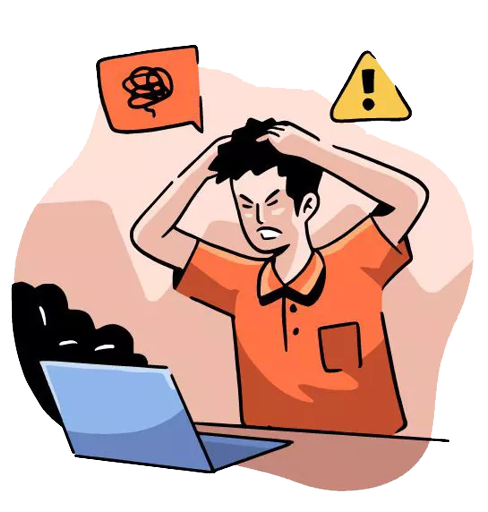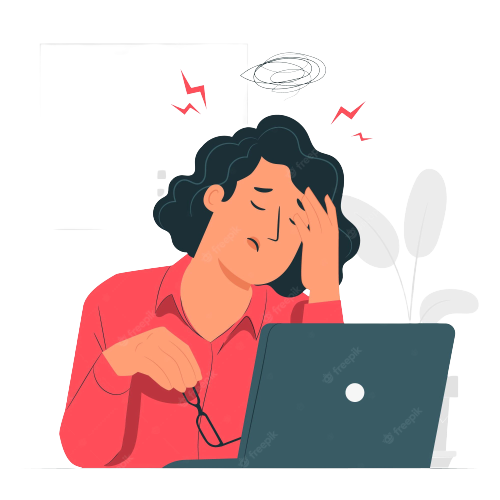Stress Counselling
Stress is often defined as a bodily response to the demands of life. But there are also emotional and mental aspects of stress. It is experienced as thoughts and feelings as well as in the body. Another way to define stress could be as an internal and conditioned response to external pressures.
Mental health professionals often help people reduce and manage their stress. They can also help people work through other mental health issues that have developed while coping with high levels of stress over a period of time.


Stress Management Online Counselling
The purpose of Stress Management Counselling and Psychotherapy is not to eliminate stress from your life. This is impossible. Stress is a natural response to change, and change is inevitable. Having a certain amount of stress in your life is normal. However, cumulative stress that results from excessive exposure to hassles, responsibilities, daily pressures, concerns, worries, and anger threatens our health and happiness.
You may have never been taught how to take care of yourself in a positive and caring way. The skills of relaxation and focused concentration aren’t often taught in higher education curriculums, but they are vital to learning and being healthy and happy now and in your future.
The first step in dealing with stress is becoming aware of what stresses you and how your body reacts to it. Many of us have become experts at desensitizing ourselves or ignoring our bodies’ signals. The question you have to ask yourself is this: Am I ready to take responsibility for paying attention to my stressors and how stress manifests in my life? Taking this first step will enhance your quality of life right now.
Types of Stress
Acute stress
Episodic Acute Stress
Episodic Acuteb Stress happens when you have frequent episode of acute stress.This might happen wjhen you are oftebn anxious and worried about things you suspoect may happen you might feel that your life is chaotic and you seemingly go from one crisis to the next.
Chronic Stress
When you have high-stress levels for an extended period of time, you have chronic stress. Long-term stress like this can have a negative impact on your health.
What Causes Stress ?
Stress can be caused by any type of physical or emotional stimulus or situation. Often, people speak of different types of stress such as work stress, relationship stress, or parenting stress. Some kinds of stress may be related to specific stages of life such as aging, pregnancy, the teen years, or the menopausal transition. Children can also be affected by stress.
Despite its source, any type of stress can become unmanageable or overwhelming. The following are risk factors for uncontrollable stress:
- Social and financial problems
- Physical or mental illness
- Lack of social support networks
- Family history of stress or family discord

SYMPTOMS OF STRESS :
PHYSICAL SYMPTOMS
- Headaches and migraines
- Muscle tension
- Loss of appetite
- Cravings
- Indigestion, or gas, acid reflux, Stomach aches
- Not wanting to be active
- Being accident prone
- Weight gain
- Weight loss
- Shortness of breath
- Feeling exhausted
- Sleeping a lot
- Having difficulty falling asleep or sustaining restful sleep
- Elevated blood pressure
- Cold hands
- Chest pain
- Lack of sex drive
- Jitters
- Diarrhoea
- Constipation
- Racing heartbeat
- Extreme PMS
- Lethargy
- Disturbing dreams or nightmares
- New aches or pains
- Inability to shake off a cold
- Excessive eating
- Stress eating
- Jaw pain or grinding of teeth
EMOTIONAL SYMPTOMS
- Rumination about or rehashing
- stressful memories
- Feeling defensive
- Crankiness
- Having difficulty remembering things
- Freezing or not being able to retrieve information
- Not being able to laugh or see the humor in situations
- Crying spells
- Change in voice tone
- Quick temper
- Racing thoughts
- Constant negative self-talk
- Depression
- Bad mood
- Feeling numb
SOCIAL SYMPTOMS
- Shyness
- Aggressiveness
- Loss of voice
- Becoming violent or lashing out
- Feeling isolated or lonely
- Seeking isolation; not wanting to go out
- Passivity
- Having difficulty following a conversation
- Lowered desire for sex
- Inability to get organized
- Confusion
- Forgetfulness
- Pessimistic outlook
- Using others
INTELLECTUAL SYMPTOMS
- Test anxiety
- Public speaking anxiety
- Having difficulty focusing
- Inability to prioritize
- Procrastination
- Making excuses, blaming
- Staring off into space; inability to focus
- Lack of motivation
- Irrational thoughts





